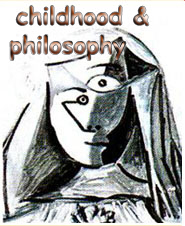doing philosophy with children. an utopian path from socrates to hannah arendt
DOI:
https://doi.org/10.12957/childphilo.2018.30434Keywords:
utopia, dialogue, thinking togetherAbstract
The analysis of Hannah Arendt's Socrate opens up the possibility of a fruitful rethinking of the sense and way of conceiving philosophy with children. A way that in this proposal is defined as "Utopian", since it intends to resume, with the Socratic lesson, just how much remains in it open, undetermined, capable of reviving with enchantment in the living of the orality of a philosophical dialogue- absolutely unprecedented and unpredictable - such as that with children. The space given to the unexpected, to listening, to free divergence, then becomes radical, comes to be a paradoxical foundation of a "methodology" that cannot be captured in structured schemes and paths, since it remains open to the "utopian" space of philosophizing. The comparison with Arendt is therefore interleaved, through references to other readings that are contemporary of the Socratic lesson, with the experience lived of the author, who has been leading for years philosophy workshops with primary school children. Of course, Socrates has never been and never wanted to act as a "master": his conducting the dialogue, although always being asymmetric, is aimed at bringing the interlocutor on his line of reasoning and never the opposite (obvious and almost paradoxical in Plato), has never had as end the teaching of some doctrine. How much, rather, to lead the interlocutor from the presumed certainty to radical uncertainty, from opinion to doubt, from affirmation to aporia. Thiswe must authentically experiment, before anything else, when we place ourselves inlistening to children's questions, when we try to dialogue with them, to "do philosophy", to "think together".Downloads
Published
2018-05-07
How to Cite
iiritano, massimo. (2018). doing philosophy with children. an utopian path from socrates to hannah arendt. Childhood & Philosophy, 14(30), 471–482. https://doi.org/10.12957/childphilo.2018.30434
Issue
Section
articles




